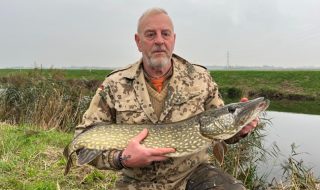The Environment Agency (EA) has admitted that it has failed to follow its own procedures when investigating pollution incidents which cause fish kills.
Fish Legal has criticised the EA about its pollution response several times over the past few years, but the Environment Agency had previously refused to accept this criticism. Fish Legal has now been able to use the EA’s own data, obtained through a freedom of information (FOI) enquiry, to back up its complaint. The EA then commissioned an internal audit in response, which confirmed Fish Legal’s findings that there were serious issues that needed addressing.
The EA audit and Fish Legal’s analysis exposed poor or non-existent record keeping, and a failure to monitor performance in responding to pollution incidents as part of the EA’s fisheries function. It found that fish kill assessment reports and post-pollution fish stock surveys were lacking or inconsistently provided. Response times to pollution incidents similarly appeared poor, and expert fishery staff were often not sent out to investigate fish kill incidents.
Fish Legal concluded in its letter to the EA Head of Fisheries that – among other factors – structural and internal management issues caused this poor performance, with insufficient focus on fisheries team involvement when incidents were being reported. Operational instructions were also not being complied with by Environment Management Team staff, who decide on the nature of the initial response to reports of pollution incidents.
This is important because the quality of regulatory response depends on accurate information being obtained early on through appropriate and timely action. The failings exposed by Fish Legal and the internal audit mean that enforcement action against polluters can be severely hindered (or not occur at all), because of failures in reacting to pollution events and/or keeping accurate and complete records of consequent investigations. Furthermore, Fish Legal has at times not been provided with the information it needs when fighting civil claims against polluters on behalf of its member clubs and fishery owners, because the Agency simply does not have it.
The EA’s internal audit accepted that action was required to address Fish Legal’s criticisms. The Audit recommended further action by Environment Agency Directors in several areas:
- Internal record-keeping
- Accuracy of information recorded
- Involvement of fisheries staff following fish-kills
- Compliance with its own internal procedures
- Contacting angling clubs and fishery owners to record amenity impacts of pollution
The EA took approximately 6 months to respond to Fish Legal’s FOI request, and even then it was unable to confirm that the information it had supplied was entirely accurate or complete. It took a further 9 months for the audit findings to be presented to Fish Legal, apparently because EA senior management was unwilling to reveal its findings outside the organisation. Fish Legal welcomes the Head of Fisheries’ efforts towards greater transparency, and also his personal commitment to work with Fish Legal and the Angling Trust to improve performance and build confidence in this area.
The Environment Agency is now drawing up a plan to implement the audit recommendations on which Fish Legal and the England Fisheries Group will be consulted. However, at the heart of this problem is too few fisheries staff, conflicting internal priorities and under-funding, all of which will be made worse by imminent government spending cuts.
Fish Legal and the Angling Trust remain concerned that the Environment Agency is in danger of failing in its statutory duty to maintain, improve and develop fisheries unless matters improve, and they are calling for:
- The Government to cancel its planned funding cuts, which will lead to the loss of approximately 1,500 EA staff.
- An increase in fisheries staff undertaking a more prominent and consistent role in pollution investigations.
- More of the costs of investigations to be recovered from polluters who are prosecuted. Often these are not fully recovered and are met by the government and revenue from anglers’ rod licences.
- Structural reform within the Agency to address the fundamental problems with the chain of command, which puts fisheries staff under the control of Area Managers, rather than the Head of Fisheries.
- Immediate action to improve record-keeping, and the accuracy of records kept.
Penelope Gane, Trainee Legal Executive at Fish Legal, who currently leads the investigation said:
“We are pleased that the Environment Agency has at last agreed that it has not been responding to pollution incidents correctly. Whilst we appreciate that it is not possible for a fisheries officer to attend every pollution incident, we certainly do not expect them to be kept in the dark if there is a fish kill on their patch. We will be watching very closely to check that the Agency collects and records information about the effects of pollution in future so that polluters are held fully accountable for their actions and so Fish Legal can claim adequate civil damages on behalf of its affected member clubs, riparian owners and fisheries.”
William Rundle, Head Solicitor at Fish Legal said:
“This audit confirms that Fish Legal was correct in claiming over many years that fish kill investigations have regularly not been properly carried out. One of the major surprises coming out of this investigation was that in some cases the regulator was simply unable to tell us what it had done or why it hadn’t acted in a particular way following a fish kill incident. This needs to change. The EA needs to sharpen-up in its protection of fisheries. EA fisheries staff do an excellent job under very difficult conditions, but we need more of them and for them to be much better resourced.“
He added:
“If the EA were better at recovering the costs of investigations from polluters then this could mean more money for better incident responses, and a greater willingness of managers to spend resources in this area.”
Mark Lloyd, Chief Executive of the Angling Trust and Fish Legal said:
“Our legal team has done a huge amount of work to expose these failures and to get the Agency to accept that change is needed. We are very grateful for the support of tens of thousands of anglers who have generously paid subscriptions and donations to Fish Legal and the Angling Trust, without which we would not have been able to win this important battle for the benefit of fish and fishing. We will be pressing for fundamental change to the way the organisation operates in future on the back of this investigation, which has been upheld by the Agency’s own internal audit.”






